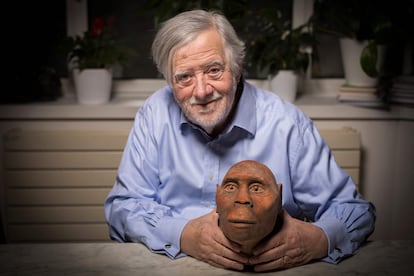Yves Coppens, one of the discoverers of famous fossil ‘Lucy,’ dies at 87
The French paleontologist was a member of the 1974 expedition that found a 3.2- million-year-old female hominid who was able to walk upright

In 1974, Yves Coppens and other colleagues discovered what is probably the most famous fossil in the world. The French paleontologist, who has just died at age 87, was then working in the Ethiopian region of Afar, on an expedition organized by Louis Leakey at the request of Emperor Haile Selassie. In the middle of a desert that was long ago covered by a lake, 52 bones of Australopithecus afarensis were found. It was the skeleton of a female about 20 years old who was already walking upright more than three million years ago. That finding offered unprecedented information about what happened between the present and the time when the lineage of chimpanzees and humans separated, just over four million years ago, and how we began to walk upright.
Coppens used to say that, in addition to its scientific value, that complete fossil, which one could imagine walking and climbing trees in the savannah, allowed the public to get emotionally closer to that remote ancestor. In addition, the fossil had the good luck of receiving an ingenious name. In the middle of the celebration over the discovery, Lucy in the Sky with Diamonds by The Beatles started playing, and Pamela Alderman, girlfriend of expedition leader Donald Johanson, proposed that they call her Lucy. The name caught on.
Coppens discovered his first hominid, Tchadanthropus uxoris, in 1961 at a site in Chad. Later, in addition to unearthing other remains of human ancestors, he suggested influential theories about the ecological changes that allowed our species to flourish. An intense climate change three million years ago, and the tectonic movements that formed the Rift Valley, created the right conditions for humanization.
The drier environment in East Africa would have reduced the number of trees, making it more interesting to walk upright, or at least, as Lucy did, to combine it with life in the trees. The environmental transformation also reduced the available vegetation and pushed those protohumans to eat more meat. This food provided the necessary energy to develop a great brain. Coppens, aware of the importance of names in paleoanthropology, called his hypothesis the “East Side Story.” In the west of the continent, more humid and forested, evolution continued its course to give rise to the chimpanzee.
Coppens was born in 1934 in Vannes, the son of a physicist and a pianist. There, in France’s Brittany region, his passion for archeology was nurtured. According to an interview he gave to the Spanish daily ABC, it is a part of France where fossils are abundant and it is easy to find megalithic structures or lines of menhirs. All this fueled his interest in exploring a deep past in which he could reconstruct the history that separated us from the animal world, by unearthing fossils millions of years old. “Our history begins in the hip, because it is the key element [to walking upright]”, he said about the key to our origin.
“Yves Coppens has left us this morning. My sadness is immense. Yves Coppens was a great scholar, a world-renowned paleontologist, a member of countless foreign institutions, but, above all, a professor at the Collège de France and a member of the Academy of Sciences,” his editor, Odile Jacob, wrote on Twitter. “His kindness, his sense humor, his loyalty, his erudition were matched only by his talent as a writer. [...] France loses one of its great men.”
#Yves Coppens nous a quittés ce matin. Ma tristesse est immense. Yves Coppens était un très grand savant, paléontologue de renommée mondiale, membre d’innombrables institutions étrangères, mais surtout professeur au Collège de France et membre de l’Académie des sciences.
— Odile Jacob (@EditriceOJacob) June 22, 2022
Tu suscripción se está usando en otro dispositivo
¿Quieres añadir otro usuario a tu suscripción?
Si continúas leyendo en este dispositivo, no se podrá leer en el otro.
FlechaTu suscripción se está usando en otro dispositivo y solo puedes acceder a EL PAÍS desde un dispositivo a la vez.
Si quieres compartir tu cuenta, cambia tu suscripción a la modalidad Premium, así podrás añadir otro usuario. Cada uno accederá con su propia cuenta de email, lo que os permitirá personalizar vuestra experiencia en EL PAÍS.
¿Tienes una suscripción de empresa? Accede aquí para contratar más cuentas.
En el caso de no saber quién está usando tu cuenta, te recomendamos cambiar tu contraseña aquí.
Si decides continuar compartiendo tu cuenta, este mensaje se mostrará en tu dispositivo y en el de la otra persona que está usando tu cuenta de forma indefinida, afectando a tu experiencia de lectura. Puedes consultar aquí los términos y condiciones de la suscripción digital.









































